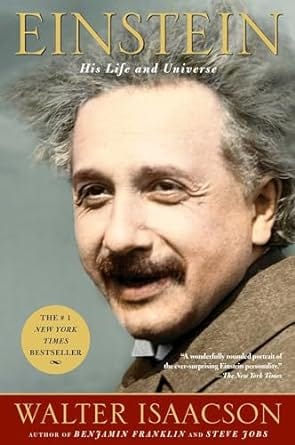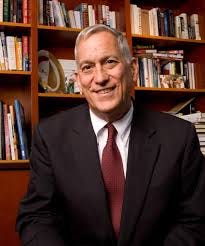How Einstein earned his intuition (#48)
Biographer and former editor of Time, Walter Isaacson, points out a few key elements that led Einstein's to creative breakthroughs
“A new idea comes suddenly and in a rather intuitive way. But intuition is nothing but the outcome of earlier intellectual experience.”
Albert Einstein
How does one make breakthrough discoveries?
In the introduction to his biography, Einstein: His Life and Universe, Walter Isaacson sums up his answer to that question—as least as it applies to that German-born, Swiss-bred theoretical physicist that changed the world.
Referring to Einstein’s quote above (“intuition is nothing but the outcome of earlier intellectual experience”), Isaacson explains how Einstein attained that intellectual experience:
Einstein’s discovery of special relativity involved an intuition based on a decade of intellectual as well as personal experiences. The most important and obvious, I think, was his deep understanding and knowledge of theoretical physics. He was also helped by his ability to visualize thought experiments, which had been encouraged by his education in Aarau. Also, there was his grounding in philosophy: from Hume and Mach he had developed a skepticism about things that could not be observed. And this skepticism was enhanced by his innate rebellious tendency to question authority. Also part of the mix—and probably reinforcing his ability to both visualize physical situations and to cut to the heart of concepts—was the technological backdrop of his life: helping his uncle Jakob to refine the moving coils and magnets in a generator; working in a patent office that was being flooded with applications for new methods of coordinating clocks; having a boss who encouraged him to apply his skepticism; living near the clock tower and train station and just above the telegraph office in Bern just as Europe was using electrical signals to synchronize clocks within time zones; and having as a sounding board his engineer friend Michele Besso, who worked with him at the patent office, examining electromechanical devices.
There are a lot of pieces here, but the most interesting tension is between two ideas.
On the one hand, Einstein was steeped in physical and philosophical theory from a young age. He learned the fundamentals of physics, mechanics, and electricity from various authoritative texts and teachers.
At the same time, from a young age, Einstein was skeptical—even rebellious—of formal education and establishment. “A foolish faith in authority is the worst enemy of truth,” he once wrote.
It’s the tension between these two ideas, says Isaacson, that led to Einstein’s creativity.
That’s the subject of today’s OGT.
First, learn what’s fundamental
Einstein’s greatest intellectual stimulation came from a poor medical student who used to dine with his family once a week…His name was Max Talmud…and he began his weekly visits when he was 21 and Einstein was 10.
For the next 5 years (1889 to 1894), Talmud would introduce young Albert to the world of science1 and philosophy—everyone from Hume to Kant— from the general to the complex. Albert was fascinated.
Talmud brought him science books, including a popular illustrated series called People’s Books on Natural Science, ‘a work which I read with breathless attention,’ said Einstein. The twenty-one little volumes were written by Aaron Bernstein, who stressed the interrelations between biology and physics… In the opening section of the first volume, Bernstein dealt with the speed of light, a topic that obviously fascinated him.
…
Talmud also helped Einstein continue to explore the wonders of mathematics by giving him a textbook on geometry two years before he was scheduled to learn that subject in school… Years later, in a lecture at Oxford, Einstein noted, “If Euclid failed to kindle your youthful enthusiasm, then you were not born to be a scientific thinker.”
It wasn’t all reading and passive learning. Talmud would assign him homework, and Einstein gladly did it. By the end of their time together, Einstein, in some areas, more advanced than Talmud.
When Talmud arrived each Thursday, Einstein delighted in showing him the problems he had solved that week….“After a short time, a few months, he had worked through the whole book,” Talmud recalled. “He thereupon devoted himself to higher mathematics… Soon the flight of his mathematical genius was so high that I could no longer follow.”
At the same time as he was learning theory, Einstein was hands on.
His father and uncle were electrical engineers, and young Albert would spend time working at their shop.2 From this practice, he developed an understanding of how things are put together, and how electrical current works. This was critical for the General Theory of Relativity.3
After Talmud, then 16, Einstein applied to a technical college called the Zurich Polytechnic. He studied for it on his own.
So he bought all three volumes of Jules Violle’s advanced physics text and copiously noted his ideas in the margins. His work habits showed his ability to concentrate, his sister recalled… That summer, at age 16, he wrote his first essay on theoretical physics, which he titled “On the Investigation of the State of the Ether in a Magnetic Field.”
Though he failed part of the exam, he excelled on the math and physics portion, and eventually got in. And it was at the ZP—a research university— that he started to display a lot more of that second characteristic: his skepticism.
Then, question it
Isaacson writes how one teacher, Professor Weber, was his favorite teacher to start, but eventually became the subject of his rebellion:
Professor Weber’s pronouncement on Einstein echoed that of the irritated teacher at the Munich gymnasium a few years earlier. “You’re a very clever boy, Einstein,” Weber told him. “An extremely clever boy. But you have one great fault: you’ll never let yourself be told anything.”
Quoting Einstein, Isaacson adds:
“Critical comments by students should be taken in a friendly spirit,” he said. “Accumulation of material should not stifle the student’s independence. A society’s competitive advantage will come not from how well its schools teach the multiplication and periodic tables, but from how well they stimulate imagination and creativity.”
He continues to show how Einstein went around what was conventionally taught, to self-study at the cutting edge:
Because many of the Polytechnic lectures seemed out of date, Einstein and his friends read the most recent theorists on their own. “I played hooky a lot and studied the masters of theoretical physics with a holy zeal at home,” he recalled. Among those were Gustav Kirchhoff on radiation, Hermann von Helmholtz on thermodynamics, Heinrich Hertz on electromagnetism, and Boltzmann on statistical mechanics. Einstein also read, in his spare time, Henri Poincaré, the great French polymath who would come tantalizingly close to discovering the core concepts of special relativity.
In the end, Isaacson seems to say, it was his building a bedrock of knowledge, constantly questioning it, and opening his imagination that led4 to his ideas:
His success came from questioning conventional wisdom, challenging authority, and marveling at mysteries that struck others as mundane.
Ironically, once he had achieved originality, he himself became the authority. As Einstein lamented:
“To punish me for my contempt for authority, fate made me an authority myself.”
The OGT
“You can trust your intuition when you have expertise,” said the late Nobel prize-winning behavioral scientist, Daniel Kahneman.
The basic point is that you need expertise, but you also need to be in an environment that operates with rules. A world where predictions based on experience and data are likely to be accurate.
For Einstein, the universe— based on the laws of physics, math, chemistry, and/or god— was such an environment. And, critically, he had the requisite experience and expertise to interpret those laws.
But critical, too, was that consistent questioning.
There’s a famous quote by George Bernard Shaw: “The reasonable man adapts himself to the world: the unreasonable one persists in trying to adapt the world to himself. Therefore all progress depends on the unreasonable man.”
With respect to Bernie (we’re close), I think that’s wrong.
The “unreasonable man” or the rebel—the Einstein—doesn’t adapt the world to himself. He just presses harder, he stays longer, to understand the world.
And, as Ray Dalio has pointed out, once you understand reality better, you can make better decisions, that are—contrary to GBS’ saying—actually more aligned with the world.
Interesting side note— learning science quickly had Einstein questioning the probability of religious teachings: “Through the reading of popular scientific books, I soon reached the conviction that much in the stories of the Bible could not be true. The consequence was a positively fanatic orgy of freethinking coupled with the impression that youth is intentionally being deceived by the state through lies; it was a crushing impression.”
His father and uncle wanted him to become an engineer, but Albert was, hilariously, repulsed by it. He wrote a friend: “I was originally supposed to become an engineer, but the thought of having to expend my creative energy on things that make practical everyday life even more refined, with a bleak capital gain as the goal, was unbearable to me. Thinking for its own sake, like music!”
The theory, at it’s core—as Carlo Rovelli discusses in his great book (which I wrote more about here)—has to do with a tension between Clerk Maxwell’s electromagnetic field and Newton’s laws of motion and gravity. To see the tension, one had to first know the fundamentals of electricity and mechanics.
That, plus Isaacson gives a nod to Einstein’s ability to visualize, day dream, and hold a problem in his head for a long time: “as a theorist, his success came not from the brute strength of his mental processing power but from his imagination and creativity. He could construct complex equations, but more important, he knew that math is the language nature uses to describe her wonders. So he could visualize how equations were reflected in realities—how the electromagnetic field equations discovered by James Clerk Maxwell, for example, would manifest themselves to a boy riding alongside a light beam. As he once declared, ‘Imagination is more important than knowledge.’”



